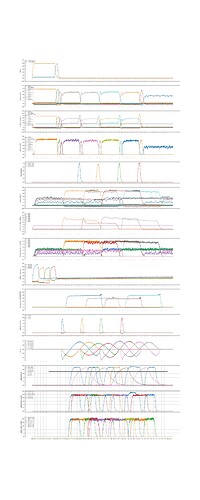Dear all
in older versions of the SPA I used different vocabs or subvocabs in order to separate S-pointers which were activated in different state buffers.
In the current SPA version (import nengo_spa as spa) I run in trouble when I try to use binding together with different vocabs.
Is it still possible in the current spa version to define subvocabs (or better different vocabs in one module) like done here:
----------------------
here: define ony one vocab (and perhabs subvocabs!)
dimensions = 64 # 512
vocab = spa.Vocabulary(dimensions)
words_visu_in = [‘V_Ball’, ‘V_Auto’, ‘V_rot’, ‘V_blau’]
words_concepts = [‘K_Ball’, ‘K_Auto’, ‘K_rot’, ‘K_blau’]
words_audi_in = [‘A_Objekt’, ‘A_Farbe’]
words_motor_out = [‘M_Ball’, ‘M_Auto’, ‘M_rot’, ‘M_blau’]
words_control = [‘NEUTRAL’, ‘V_IN’, ‘A_IN’, ‘GEN_INFO’, ‘GEN_ERG’, ‘SEL_KON’]
vocab:
for w1 in words_visu_in:
vocab.parse(w1)
for w2 in words_motor_out:
vocab.parse(w2)
for w3 in words_audi_in:
vocab.parse(w3)
for w4 in words_control:
vocab.parse(w4)
for w5 in words_concepts:
vocab.parse(w5)
vocab.add(‘Obj_Ball’, vocab.parse(‘A_Objekt * V_Ball’))
vocab.add(‘Obj_Auto’, vocab.parse(‘A_Objekt * V_Auto’))
vocab.add(‘Farbe_rot’, vocab.parse(‘A_Farbe * V_rot’))
vocab.add(‘Farbe_blau’, vocab.parse(‘A_Farbe * V_blau’))
subsets:
vocab_visu_in = vocab.create_subset(words_visu_in)
vocab_motor_out = vocab.create_subset(words_motor_out)
vocab_audi_in = vocab.create_subset(words_audi_in)
vocab_control = vocab.create_subset(words_control)
vocab_concepts = vocab.create_subset(words_concepts)
vocab_info = vocab.create_subset([‘Obj_Ball’, ‘Obj_Auto’, ‘Farbe_rot’, ‘Farbe_blau’])
-----------
What I want is, to define vocabs for these keys (in order to do the convolution, i.e., the binding and unbinding processes with defined separate vocabs):
vocab_syll_mem_keys = [‘BAP’, ‘GUP’, ‘DIP’, ‘NONE’]
vocab_pos_keys = [‘Pos01’, ‘Pos02’, ‘Pos03’, ‘Pos04’]
vocab_conv_syll_pos_keys = [‘BAP * Pos01’, ‘GUP * Pos02’, ‘DIP * Pos03’, ‘BAP * Pos04’]
Kind regards
Bernd
